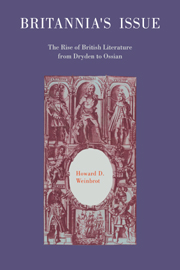Book contents
- Frontmatter
- Contents
- Acknowledgments and editorial notes
- INTRODUCTION: An overview of scope and method
- PART I CONTEXTS: INTELLECTUAL, PSYCHOLOGICAL, AND NATIONAL
- PART II TEXTS WITHIN CONTEXTS. ESSAYING ENGLAND: OUR GENIUS, OUR CLIME
- PART III GROWING ONE'S OWN. THE BRITISH ODE FROM COWLEY TO GRAY
- PART IV EXPANDING THE BORDERS. JEWS AND JESUS: THIS ISRAEL, THIS ENGLAND
- Prologue to Part IV
- 11 THE HOUSE OF DAVID AND THE HOUSE OF ST. GEORGE: PHILOSEMITISM, HEBREWS, AND HANDEL
- 12 BEYOND THE HEBREW LEAVEN: SMART AND THE GOD IN CHRIST
- PART V CELTS, GERMANS, AND SCOTS: TOWARDS A UNITED KINGDOM
- APPENDIX: The text of Handel's “Israel in Egypt”
- Index
12 - BEYOND THE HEBREW LEAVEN: SMART AND THE GOD IN CHRIST
Published online by Cambridge University Press: 15 December 2009
- Frontmatter
- Contents
- Acknowledgments and editorial notes
- INTRODUCTION: An overview of scope and method
- PART I CONTEXTS: INTELLECTUAL, PSYCHOLOGICAL, AND NATIONAL
- PART II TEXTS WITHIN CONTEXTS. ESSAYING ENGLAND: OUR GENIUS, OUR CLIME
- PART III GROWING ONE'S OWN. THE BRITISH ODE FROM COWLEY TO GRAY
- PART IV EXPANDING THE BORDERS. JEWS AND JESUS: THIS ISRAEL, THIS ENGLAND
- Prologue to Part IV
- 11 THE HOUSE OF DAVID AND THE HOUSE OF ST. GEORGE: PHILOSEMITISM, HEBREWS, AND HANDEL
- 12 BEYOND THE HEBREW LEAVEN: SMART AND THE GOD IN CHRIST
- PART V CELTS, GERMANS, AND SCOTS: TOWARDS A UNITED KINGDOM
- APPENDIX: The text of Handel's “Israel in Egypt”
- Index
Summary
OLD TESTAMENT, OLD NEWS
Thus far the good news. Whether or not Toland was right regarding the ample Jewish heritage of Anglican prelates, their church remained the Church of England and not of Israel; their Messiah had come and was not merely anticipated. Cromwell's 1655 effort to reinvite the Jews to England failed, though it succeeded in encouraging a small number to immigrate on an ad hoc basis. According to William Prynne in 1656, even converting Jews could be dangerous. They should not be readmitted, W. H. says in the same year, for they will commit “horrid and unlawful actions,” including murder, “so they can but thereby scoff at and deride the Christian profession.” Bishop Richard Kidder later adds that the Jews deserve to have little power, for they are enemies to Christianity, give the wicked Deists their main artillery, and in their synagogues lack civil conduct and devotion.
The clamor raised by the later Jewish Naturalization Bill – the Jew Bill of 1753 – was a convenient cesspool for anti-Jewish sentiment in words and pictures. Here is a partial catalogue of the seeds of revulsion, destined to flourish in the ashes of Buchenwald. Jews were absorbers of native culture and outsiders of native culture; bribers; cheats; crucifiers of Christ and Christian children; enemies of God, Christ, and the Church; foreigners; killers of Jewish converts to Christianity; promiscuous circumcisers of men and horses; too clever and too stupid; too rich and too poor; usurers; vengeful; and of course mortal enemies to pork. In many cases, these cries were amplified by Tory preachers in political sermons.
- Type
- Chapter
- Information
- Britannia's IssueThe Rise of British Literature from Dryden to Ossian, pp. 446 - 474Publisher: Cambridge University PressPrint publication year: 1993



